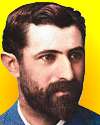 (source)
(source)
|
Léo Errera
(4 Sep 1858 - 1 Aug 1905)
Belgian botanist who was middle aged when he died, and yet left a prolific output of papers which when collected were planned to fill six volumes. To mention a few of the topics he covered: plant nomenclature, plant physiology, relation of plants to the environment, and the scientific basis of agriculture.
|
Science Quotes by Léo Errera (10 quotes)
“Le génie n'est qu'une longue patience”, a dit Buffon. Cela est bien incomplet. Le génie, c'est l'impatience dans les idées et la patience dans les faits : une imagination vive et un jugement calme; quelque chose comme un liquide en ébullition dans un vase qui reste toujours froid.
“Genius is just enduring patience,” said Buffon. This is far from complete. Genius is impatience in ideas and patience with the facts: a lively imagination and a calm judgment, rather like a liquid boiling in a cup that remains cold.
“Genius is just enduring patience,” said Buffon. This is far from complete. Genius is impatience in ideas and patience with the facts: a lively imagination and a calm judgment, rather like a liquid boiling in a cup that remains cold.
— Léo Errera
In Recueil d'Œuvres de Léo Errera: Botanique Générale (1908), 198. Google translation by Webmaster.
Altruisme des sylviculteurs pouvant servir de devise à l'humanité en général : «Nous récoltons ce que nous n’avons pas semé. Nous semons ce que nous ne récolterons pas.»
The altruism of foresters can serve as a motto for humanity in general: “We reap what we have not sown. We sow what we do not reap.”
The altruism of foresters can serve as a motto for humanity in general: “We reap what we have not sown. We sow what we do not reap.”
— Léo Errera
Cited by Bismarck, 28 Jan 1886. As given in Recueil d'Œuvres de Léo Errera: Botanique Générale (1908), 194. Google translation by Webmaster.
Dieu, c'est le voile mystérieux sous lequel nous cachons notre ignorance de la cause première.
God is the mysterious veil under which we hide our ignorance of the cause.
God is the mysterious veil under which we hide our ignorance of the cause.
— Léo Errera
In Recueil d'Œuvres de Léo Errera: Botanique Générale (1908), 193. Google translation by Webmaster.
La civilisation, c'est l'art de se créer des besoins inutiles.
Civilization is the art of creating useless needs.
Civilization is the art of creating useless needs.
— Léo Errera
In Recueil d'Œuvres de Léo Errera: Botanique Générale (1908), 198. Google translation by Webmaster.
La vérité est sur une courbe dont notre ésprit suit éternellement l'asymptote. (Oct 1879)
Truth is on a curve whose asymptote our spirit follows eternally.
Truth is on a curve whose asymptote our spirit follows eternally.
— Léo Errera
In Recueil d'Œuvres de Léo Errera: Botanique Générale (1908), 193. As translated in John Arthur Thomson, Introduction to Science (1911), 57,
La vérité ne diffère de l'erreur qu'en deux points: elle est un peu plus difficile à prouver et beaucoup plus difficile à faire admettre. (Dec 1880)
Truth is different from error in two respects: it is a little harder to prove and more difficult to admit.
Truth is different from error in two respects: it is a little harder to prove and more difficult to admit.
— Léo Errera
In Recueil d'Œuvres de Léo Errera: Botanique Générale (1908), 193. Google translation by Webmaster.
Le paradoxe, c'est de la graine de vérité. Il suffit d'un terrain propice pour que cela germe, fleurisse et fructifie.
The paradox is the seed of truth. This germ just needs a fertile ground to flourish and bear fruit.
The paradox is the seed of truth. This germ just needs a fertile ground to flourish and bear fruit.
— Léo Errera
In Recueil d'Œuvres de Léo Errera: Botanique Générale (1908), 198. Google translation by Webmaster.
Les Leucocytes Et L'esprit De Sacrifice. — Il semble, d'après les recherches de De Bruyne (Phagocytose, 1895) et de ceux qui le citent, que les leucocytes des Lamellibranches — probablement lorsqu'ils ont phagocyté, qu'ils se sont chargés de résidus et de déchets, qu'ils ont, en un mot, accompli leur rôle et bien fait leur devoir — sortent du corps de l'animal et vont mourir dans le milieu ambiant. Ils se sacrifient. Après avoir si bien servi l'organisme par leur activité, ils le servent encore par leur mort en faisant place aux cellules nouvelles, plus jeunes.
N'est-ce pas la parfaite image du désintéressement le plus noble, et n'y a-t-il point là un exemple et un modèle? Il faut s'en inspirer: comme eux, nous sommes les unités d'un grand corps social; comme eux, nous pouvons le servir et envisager la mort avec sérénité, en subordonnant notre conscience individuelle à la conscience collective. (30 Jan 1896)
Leukocytes and The Spirit Of Sacrifice. - It seems, according to research by De Bruyne (Phagocytosis, 1885) and those who quote it, that leukocytes of Lamellibranches [bivalves] - likely when they have phagocytized [ingested bacteria], as they become residues and waste, they have, in short, performed their role well and done their duty - leave the body of the animal and will die in the environment. They sacrifice themselves. Having so well served the body by their activities, they still serve in their death by making room for new younger cells.
Isn't this the perfect image of the noblest selflessness, and thereby presents an example and a model? It should be inspiring: like them, we are the units of a great social body, like them, we can serve and contemplate death with equanimity, subordinating our individual consciousness to collective consciousness.
N'est-ce pas la parfaite image du désintéressement le plus noble, et n'y a-t-il point là un exemple et un modèle? Il faut s'en inspirer: comme eux, nous sommes les unités d'un grand corps social; comme eux, nous pouvons le servir et envisager la mort avec sérénité, en subordonnant notre conscience individuelle à la conscience collective. (30 Jan 1896)
Leukocytes and The Spirit Of Sacrifice. - It seems, according to research by De Bruyne (Phagocytosis, 1885) and those who quote it, that leukocytes of Lamellibranches [bivalves] - likely when they have phagocytized [ingested bacteria], as they become residues and waste, they have, in short, performed their role well and done their duty - leave the body of the animal and will die in the environment. They sacrifice themselves. Having so well served the body by their activities, they still serve in their death by making room for new younger cells.
Isn't this the perfect image of the noblest selflessness, and thereby presents an example and a model? It should be inspiring: like them, we are the units of a great social body, like them, we can serve and contemplate death with equanimity, subordinating our individual consciousness to collective consciousness.
— Léo Errera
In Recueil d'Œuvres de Léo Errera: Botanique Générale (1908), 194. Google translation by Webmaster. Please give feedback if you can improve it.
Pour réussir dans la science, il faut douter; pour réussir dans la vie, il faut être sûr.
To succeed in science, one must doubt; to succeed in life, one must be sure.
To succeed in science, one must doubt; to succeed in life, one must be sure.
— Léo Errera
In Recueil d'Œuvres de Léo Errera: Botanique Générale (1908), 193. Google translation by Webmaster.
Que faisons-nous ici-bas? Nous préparons les floraisons de demain. Nous sommes tous du fumier d'humanité future.
What are we doing on earth? We are preparing the blossoms of tomorrow. We are all the manure of future humanity.
What are we doing on earth? We are preparing the blossoms of tomorrow. We are all the manure of future humanity.
— Léo Errera
Aphorism dated 28 Nov 1903, in Recueil d'Œuvres de Léo Errera: Botanique Générale (1908), 194. Google translation by Webmaster. You may choose to use “blooms” instead of “blossoms” depending on your context.
See also:
- 4 Sep - short biography, births, deaths and events on date of Errera's birth.
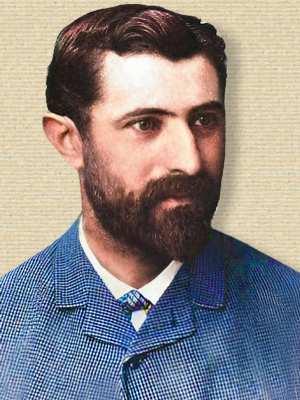
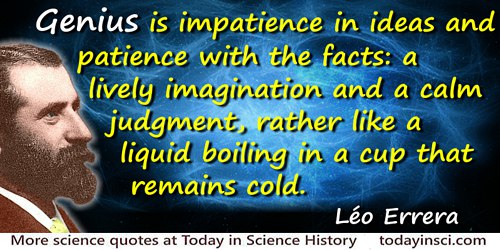
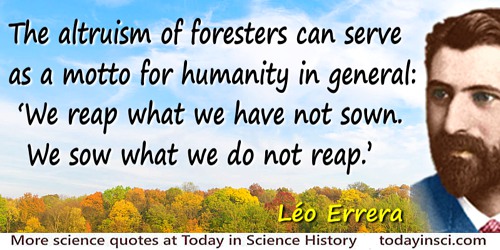

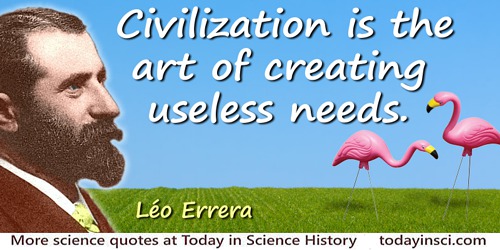

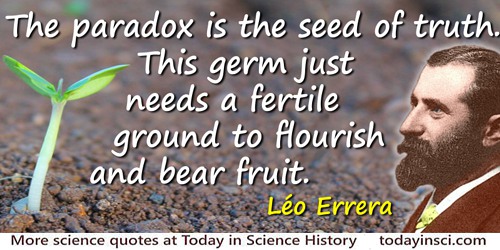


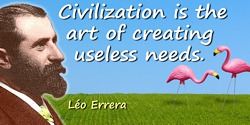
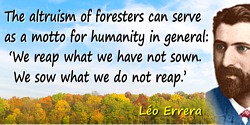

 In science it often happens that scientists say, 'You know that's a really good argument; my position is mistaken,' and then they would actually change their minds and you never hear that old view from them again. They really do it. It doesn't happen as often as it should, because scientists are human and change is sometimes painful. But it happens every day. I cannot recall the last time something like that happened in politics or religion.
(1987) --
In science it often happens that scientists say, 'You know that's a really good argument; my position is mistaken,' and then they would actually change their minds and you never hear that old view from them again. They really do it. It doesn't happen as often as it should, because scientists are human and change is sometimes painful. But it happens every day. I cannot recall the last time something like that happened in politics or religion.
(1987) -- 


